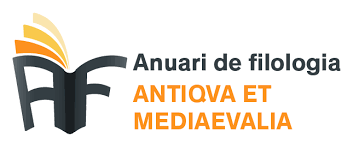THE ADDRESSEE-SHIP OF ANCIENT GREEK NOVELS: PORTRAYING PICTURES, DEBUNKING MYTHS
DOI:
https://doi.org/10.1344/AFAM2021.11.1.1Palabras clave:
ancient Greek literature, ancient Greek novel, literary addressees, novelistic genre readership.Resumen
This paper delves into the question of the potential addressees of ancient Greek novels. After shedding some light on the matter (based on ancient sources which account for the sociocultural underpinnings of the new genre), a classification is established in an attempt to provide a deeper understanding of alleged homogeneity in readership. The entire bibliography demonstrates a discontinuation in the conception prevalent decades ago, which, based on subjective and anachronistic interpretations, would find reinforcement in the silence of ancient sources. To make matters more intricate, the surviving information regarding how the novel was viewed in ancient times appears not to point to a prestigious status thereof. All things considered, should these presumptions alone lead us to consider the novel as a low-quality genre in terms of literary and stylistic standards? Ancient Greek novel might well be one of those cases in which literary or cultural creations have called for reassessment and revaluation several centuries following their conception.
Descargas
Publicado
Cómo citar
Número
Sección
Licencia
El/la autor/a que publica en esta revista está de acuerdo con los términos siguientes:a. El/la autor/a conserva los derechos de autoría y otorga a la revista el derecho de primera publicación de la obra
b. Los textos se difundirán con la licencia de reconocimiento de Creative Commons que permite compartir la obra con terceros, siempre que éstos reconozcan su autoría, su publicación inicial en esta revista y las condiciones de la licencia.
Tasas por envios y publicación: AFAM no cobra tasas por envios de trabajos, ni cuotas por la publicación de sus artículos.






